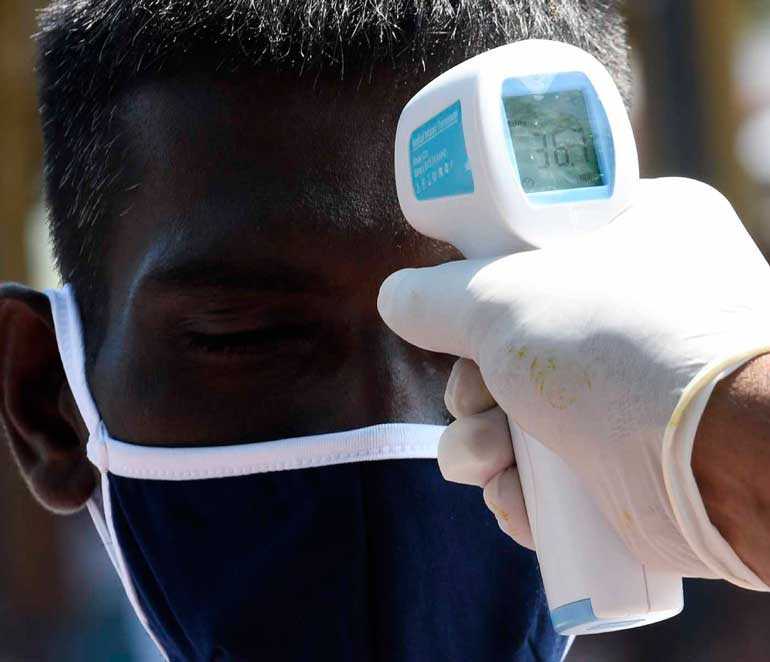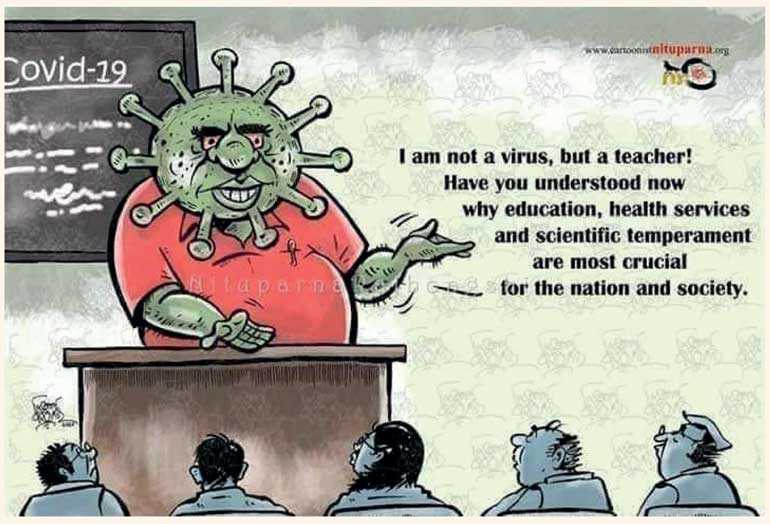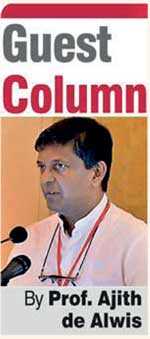Wednesday Feb 18, 2026
Wednesday Feb 18, 2026
Thursday, 23 April 2020 00:00 - - {{hitsCtrl.values.hits}}


While some may be raring to have an election and for the usual politics to take centre stage, the reality is that the virus officially known as SARS-Cov-19 is not yet finished and it can be considered safe and  completely defeated only when a vaccine is available not from a lab but from a manufacturing facility with the ability to scale and use across the populace.
completely defeated only when a vaccine is available not from a lab but from a manufacturing facility with the ability to scale and use across the populace.
The reality is quite difficult to digest especially to the social and economic man. Science clearly indicates the presence of the virus with an asymptotic individual with clear virus transmission potential in the upper respiratory tract even after two weeks of the initial positive. It is these asymptotic transmitters that made the outbreak to a pandemic easily. Hence the issue of multiple waves in a pandemic and 100 years ago the Spanish Flu demonstrated that, with the second wave killing more than the first wave. This is what one should learn from the hammer and dance of the epid curve. The tail of the curve can sting!
Curfew with no end in sight is also is not an option as then the cure become definitely worse than the disease. Anyway science is not indicating that draconian behaviour anyway. Coming out of the enclosures could be done under the strict principles of scientific management – local epidemiology and context – it is a fact that all cannot just get out and engage as before at will on day one post curfew. Such principles too depend take into account the system infrastructure and abilities.
It is indeed interesting that politicians of all colours are seriously pressed to accept what science dictates, many quite grudgingly and even trying to redefine virology! May be it would quite an advance if Sri Lanka is to move into meetings and discussions on TV and media than high polluting events such as mass gatherings.
If the election itself can be elevated to a smart voting platform that would be quite an achievement – blockchain or biometrics anyone? Societies can come out of this type of experiences positively or succumb to temptations and go down further. Sri Lanka can make use of the COVID-19 to reset lots of perceptions and forcibly address inefficiencies. My view is it should do so!
Relentless pursuance of a vaccine
If one can play back how the tonality of President Trump has changed, it is a lesson from the virus. The relentless pursuance of a vaccine is a must but hopefully this time financial aspects purely would not play a role.
When Zika virus was playing truant and with Olympics in Brazil there was the same drive for a vaccine and Senofi a vaccine maker finally did not come out with the vaccine, stopping the development halfway as it was identified there had been sufficient spread of the disease in the community of concern and due to the achievement of herd immunity status and with no more financial allocations the drive for the  vaccine just dried out.
vaccine just dried out.
Probably one of the most visited TED Talks during the lockdown must be the Bill Gates presentation in 2014 – The Next Outbreak? We are not ready! – taking on the world governments for not addressing pandemics! He is quite clear on the global leadership on non-pursuance of strategies that would really have reduced the burden from this pandemic.
SARS never went on to become a pandemic, nor did MARS or Ebola. This time the virus had serious pleasure trips via cruise ships and jet liners and was all over the globe in double quick time. Perhaps not understanding the need to be quick-footed on action many countries were exposed even with some response time on their side.
Previous references were not made use of. It looks as this time however, the establishments will not stop until solid advances are made against this type of possibilities. It is interesting to see while people cannot say exactly when the current episode will come to an end some are quite sure of the timeline how they would address the next threat of a similar nature. Artificial Intelligence is sure to be in the frontline – the sentinel technology.
The importance of manufacturing
Another lesson from the virus is to understand the importance of manufacturing. We witnessed when lives lost reached 100,000 globally after two months of the spread, in the No. 1 economy alone 10 million joined its unemployment queue.
The virus also managed to reverse economic growth in China where it has been going at speed for 10 years and two months of activity of the virus has halted the positive trajectory. Whoever would have ever imagined that producers of oil would be willing to pay people to take their black gold? Oil slipping below 0 dollars in the US market was a reality. If our Trinco Oil Farm was available we could have had some sweet economic gain.
Some economies have shown that they managed the pandemic much more smartly with minimum loss of lives as well as with economic impact. Germany, Taiwan, South Korea, Singapore and Australia come to my mind. Understand the significant strengths of these nations with two of them having small landmasses yet ranking high on innovation and S&T strength.
The US faltered with a faulty test kit in the early days and unresponsive rules meant dismal testing numbers at the early crucial stage. The result of the sloppiness in testing and scientific responsiveness was triple digit deaths per day though having perhaps the best S&T workforce. While similar numbers came from France, Italy and Spain, Germany was much more clinically precise and ensured that the medical system was never overwhelmed.
A strong economy need not be at the expense of a healthy environment. Humanity is still should be at the heart of response but a resilient response come with knowing your abilities. Abilities however have to be developed over time and harnessed appropriately for results and that is where we have faltered.
Sri Lanka
Lee Kuan Yew’s an early observation of African economies comes to my mind. “These one-commodity economies are never going to develop,” he has opined in his autobiography. Lee’s Singapore strategy always had industrialisation from the very beginning even before Singapore as a nation came into being.
Sri Lanka unfortunately had been totally obsessed with a service economy mindset, switching from an import substitution mindset and if you take a look at our export basket right now after 71 years of independence, it does not in any way exude joy and confidence. In US it was not the failure of its manufacturing or R&D but the decision making which was at a serious physical distancing from those elements of its society.
We must make a strong decisive effort in ensuring that an emergency can create a strong long-term impact on economy and society. Some of us have experienced a number of events that usually can be identified to occur once in one’s lifetime – a 30-year civil conflict, a tsunami and now a pandemic.
I remember another line in a book by de Bono on thinking. He highlights the positive use of his concept of six thinking hats by Sri Lanka in the efforts of post-tsunami reconstruction and his selection of this application in Sri Lanka is quite interesting as spoke of success on application.
How many institutions, especially public sector ones, use even one thinking hat, let alone all six at present? Looks as if that has been a one-off incident. Events of this magnitude while leaving an indelible mark on anything it touches should also allow one to engage in activities which should allow one to provide a new and a positive narrative subsequently.
Three once-in-a-lifetime events for some generations here, I agree following one another, can be quite challenging but we know the status of Germany having initiated, fought and losing two World Wars, Japan with two nuclear bombs and multiple earthquakes later, we understand the prowess within today. That all boils down to choices made by the community but more than by the decision makers in the path to trod subsequent to the event.
We spent a decade post 2009 but really did not strengthen the economy in ways that give it resilience and the weaknesses are telling. However it must be stated that we really did not venture in transforming the economy to a resilient economy by most of the decisions we have taken over the past 71 years. Even with industry we merely were benefitted by donations of industries rather than developing industry with a strategy and a manufacturing mindset.
Key viral lesson
The key viral lesson is there has to be the need to have a strong manufacturing base for a nation with a dynamic research and development sector and national decision making based on sound science and data.
Why this lesson is special is the virus is indicating that it is only scientific decision making that will matter moving forward, giving no other option. Like in Germany and Japan after the war, the choice is ours!